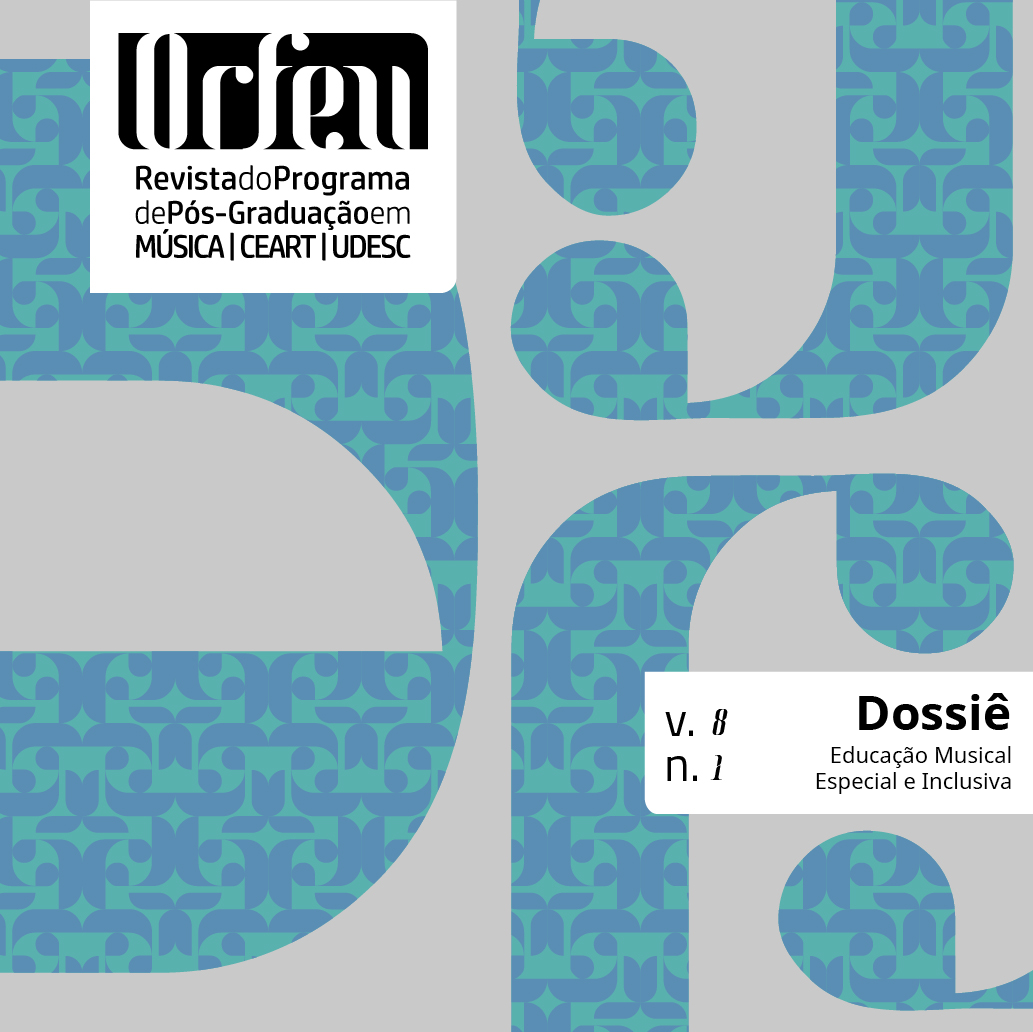Caminhos pedagógicos de uma disciplina de educação especial e inclusiva de um curso de licenciatura em música
DOI:
https://doi.org/10.5965/2525530408012023e0106Palabras clave:
educação inclusiva, educação especial, formação de professores, licenciatura em música, pessoas com deficiênciaResumen
Ainda que não se configure como uma obrigatoriedade do ponto de vista legal, o ensino inclusivo na formação de professores é uma demanda que origina-se do campo de trabalho do licenciado em música, posto que, em algum momento da sua trajetória docente, irá trabalhar com pessoas com deficiência, seja no ensino inclusivo ou até mesmo na educação especial. Compreende-se, portanto, a necessidade de que a educação especial e inclusiva seja contemplada no período da formação do licenciado em música, com a finalidade de preparar o estudante para essas situações de ensino e aprendizagem. O objetivo deste relato de experiência é o de compartilhar o processo pedagógico de uma disciplina optativa de educação especial e inclusiva no contexto de um curso de licenciatura em música de uma Instituição Pública de Ensino Superior. Por meio de registros realizados a partir de princípios e instrumentos da investigação etnográfica, expõem-se as situações de ensino aprendizagem que foram organizadas a partir dos princípios metodológicos freireanos, assim como as reflexões e os resultados. Dessa forma, ressalta-se a necessidade deste conteúdo fazer parte da formação do professor de música na graduação, e apresenta-se uma possibilidade de estruturação da proposta pedagógica da disciplina.
Descargas
Citas
BRASIL. Decreto Legislativo n.º 186, de 9 de julho de 2008. Aprova o texto da Convenção sobre os Direitos das Pessoas com Deficiência e de seu Protocolo Facultativo, assinados em Nova Iorque, em 30 de março de 2007. Diário Oficial da União: Brasília DF, Seção 1, Edição 131, p. 1, 10 jul. 2008. Disponível em: http://www2.senado.gov.br/bdsf/item/id/99423. Acesso em: 3 jun. 2023.
BRASIL. Lei n.º 13.146, de 6 de julho de 2015. Institui a Lei Brasileira de Inclusão da Pessoa com Deficiência (Estatuto da Pessoa com Deficiência). Diário Oficial da União: Brasília, DF, Seção 1, p. 2, 7 jul. 2013. Disponível em: http://www.planalto.gov.br/ccivil_03/_ato2015-2018/2015/lei/l13146.htm.
DUARTE, Duarte, Karine Rayara Peres. Educação musical especial nos cursos de licenciatura em música das universidades públicas do Paraná. 2022. 181 f. Dissertação (Mestrado em Música) – Universidade Estadual de Maringá, Centro de Ciências Humanas, Letras e Artes, Maringá, 2022.
FEITOSA, Sônia Couto. O método Paulo Freire. São Paulo: Instituto Paulo Freire, 1999. Online. Disponível em: http://www.paulofreire.org/metodo.htm. Acesso em: 8 jun. 2023.
FIGUEIREDO, Camila Fernandes. A aprendizagem musical de estudantes com autismo por meio da improvisação. Dissertação (Mestrado em Música) – Departamento de Artes, Setor de Artes, Comunicação e Design, Universidade Federal do Paraná, Curitiba, 2016.
GADOTTI, Moacir. Saber aprender: um olhar sobre Paulo Freire e as perspectivas atuais da educação. In: CONGRESSO INTERNACIONAL UM OLHAR SOBRE PAULO FREIRE, 2000, Évora. Anais […]. Évora: Universidade de Évora, 2000.
HALLAM, Susan. The Influence of Assessment on Learning and Teaching: using assessment to enhance learning. In: ELLIOTT, D. J.; SILVERMAN, M.; MCPHERSON, G. E. (ed.). The Oxford Handbook of Philosophical and Qualitative Assessment in Music Education. New York: Oxford University Press, 2019. DOI: 10.1093/oxfordhb/9780190265182.013.1
JELLISON, Judith A. Inclusive music classrooms and programs. In: McPHERSON, G.; WELCH, G. F. Special Needs, Community Music and Adult Learning: An Oxford Handbook of Music Education. New York: Oxford University Press, 2012. p. 63-79.
LOURO, Viviane dos Santos et al. Fundamentos da aprendizagem musical da pessoa com deficiência. São Paulo: Som, 2012.
LUCKESI, Cipriano Carlos. Avaliação da aprendizagem escolar: estudos e proposições. São Paulo: Cortez, 2014.
MANTOAN, Maria Teresa Eglér. Inclusão Escolar: o que é? por quê? como fazer? São Paulo: Moderna, 2003.
MELLO, Letícia Souza; CABISTANI, Luiza Griesang. Capacitismo e lugar de fala: repensando barreiras atitudinais. Revista da Defensoria Pública do Estado do Rio Grande do Sul, Porto Alegre, n. 23, p. 118-139, 2019. Disponível em: https://revistadpers.emnuvens.com.br/defensoria/article/view/112. Acesso em: 11 abr. 2023.
RAVAGNANI, Anahi. A educação musical de crianças com Síndrome de Down em um contexto de interação social. (Dissertação de Mestrado) – Programa de Pós-Graduação em Música, Universidade Federal do Paraná, Curitiba, 2009. Disponível em: https://acervodigital.ufpr.br/bitstream/handle/1884/19801/DISSERTACAO.pdf;sequence=1
SASSAKI, Romeu Kazumi. Inclusão: o paradigma do século 21. Revista Inclusão, v. 1, n. 1, p. 19-23, 2005.
SCHAMBECK, Regina Finck. Inclusão de alunos com deficiência na sala de aula: tendências de pesquisa e impactos na formação do professor de música. Revista da ABEM, Londrina, v. 24, n. 36, p. 23-35, jan./jun. 2016.
SILVA, Maria de Fatima Minetto Caldeira; FACION, José Raimundo. Perspectivas da inclusão escolar e sua efetivação. In: FACION, Jose Raimundo et al. Inclusão escolar e suas implicações. Curitiba: IBPEX, 2005.
SHOR, Ira; FREIRE, Paulo. What is the “Dialogical Method” of Teaching? Journal of Education, v. 169, n. 3, p. 11-31, 1987. DOI: https://doi.org/10.1177/002205748716900303.
SOARES, Lisbeth. Formação e prática docente musical no processo de educação inclusiva de pessoas com necessidades especiais. Dissertação (Mestrado em Ciências Humanas) – Universidade Federal de São Carlos, São Carlos, 2006.
UNESPAR. Projeto Político do Curso de Licenciatura em Música. Disponível em: https://fap.curitiba2.unespar.edu.br/assuntos/graduacao/licenciatura-em-musica.
VASCONCELOS, Teresa Maria. Aonde pensa tu que vais? Investigação etnográfica e estudos de caso. Porto: Porto Editora, 2016.
WILLE, Regiana Blank et al. Educação musical e inclusão: possibilidades de atuação. Expressa Extensão, v. 23, n. 3, p. 210-222, 2018
Descargas
Publicado
Cómo citar
Número
Sección
Licencia
Derechos de autor 2023 Camile Tatiane de Oliveira Pinto, Valéria Lüders

Esta obra está bajo una licencia internacional Creative Commons Atribución 4.0.






